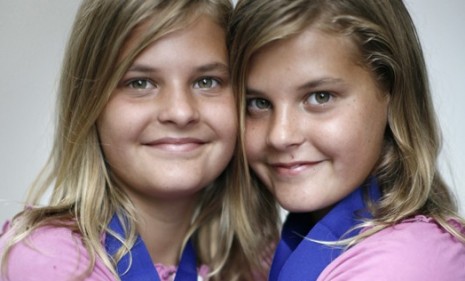5 strange new facts about twins
A new study shows that women who bear twins live longer. And that's not the only twist in science's ever-expanding understanding of double births

"The fascination with twins is as old as time," says Susan Kohl in her book Twin Stories. "Twins share a strong and powerful bond that neither time nor distance seems to shake." Because of their unique relationship, twins are often the focus of research. Here's a look at five recent studies that shine new light on these linked individuals, and what they can teach the rest of us.
1. Mothers of twins live longer
Twins have been greeted as everything from an unwanted burden to "a sign of their father's superior virility," says The Economist. But a new study from the University of Utah shows that twins "have more to do with their mother’s sturdy constitution than their father's sexual power." Looking at the birth records for 59,000 women between 1800 and 1970, researchers found that women who give birth to twins live longer, have healthier kids, and "appear to be healthier" themselves, says lead author Ken R. Smith. That's probably because sturdier women have twins, not because having twins is good for you, the study notes.
The Week
Escape your echo chamber. Get the facts behind the news, plus analysis from multiple perspectives.

Sign up for The Week's Free Newsletters
From our morning news briefing to a weekly Good News Newsletter, get the best of The Week delivered directly to your inbox.
From our morning news briefing to a weekly Good News Newsletter, get the best of The Week delivered directly to your inbox.
2. But they get divorced more often
It seems that twins can help unravel a marriage, say Dr. Anupam Jena and his colleagues at Boston's Massachusetts General Hospital. When a couple's only children are twins, parents are only about 1 percent more likely to get divorced than parents of singletons. But add in more kids (or less income), and the risk of divorce shoots up. The reason is probably the added stress, both financial and emotional.
3. Twin fetuses start playing at 14 weeks
Examining 3D ultrasound images of five pairs of in-utero twins, a team at the University of Padova, Italy, found that fetuses started deliberately interacting at 14 weeks, reaching out and touching each other through the uterine wall. By 18 weeks, they spent more time stroking each other than themselves, and were equally careful when touching their co-twin's sensitive eye areas. The results are "astonishing," says Jean-Philippe Rivière at Doctissimo. At 14 weeks, "they were already socializing with their sibling in the womb."
A free daily email with the biggest news stories of the day – and the best features from TheWeek.com
4. If you separate identical twins, they still end up similar
Surveying decades of twin research, George Mason University economist Bryan Caplan found the "most prominent conclusion" to be that "practically everything — health, intelligence, happiness, success, personality, values, interests — is partly genetic." We may latch on to the parenting-centric ideas of "Tiger Mom" Amy Chua, says Helen Rumbelow in The Australian. But the dozens of rigorous studies on separated-at-birth twins is much more persuasive than "Chua's sample of one": As adults, even separated twins are "very similar on almost every count."
5. But identical twins can get sick very differently
In 1983, two identical twin infant boys were given a blood transfusion contaminated by HIV; decades later, one has an almost-normal immune system while the other is faring much worse. Brigham Young University researchers recently tried to explain the different reactions. What they found, says Amanda Carpenter at Virology, is that once identical twins leave the womb and are "exposed to different pathogens, bacteria, and microbes," their immune systems are not identical at all.
Sources: Economist, U.S. News & World Report, Reuters, Virology, Twins Foundation, Physorg.com, Plos One, Doctissimo, Wall Street Journal, AP, Australian
-
 6 homes built in the 1700s
6 homes built in the 1700sFeature Featuring a restored Federal-style estate in Virginia and quaint farm in Connecticut
-
 Tariffs: Will Trump’s reversal lower prices?
Tariffs: Will Trump’s reversal lower prices?Feature Retailers may not pass on the savings from tariff reductions to consumers
-
 American antisemitism
American antisemitismFeature The world’s oldest hatred is on the rise in U.S. Why?